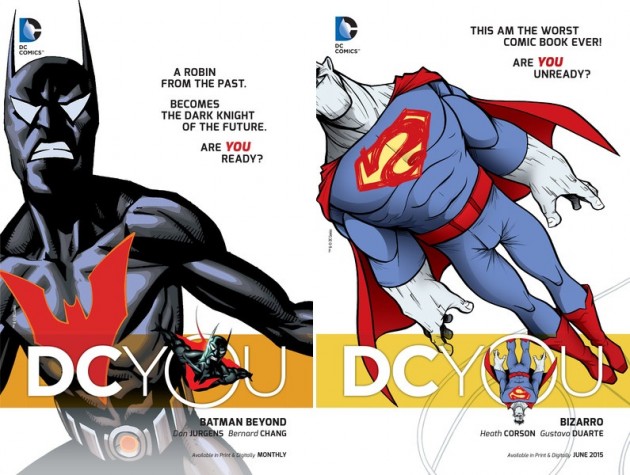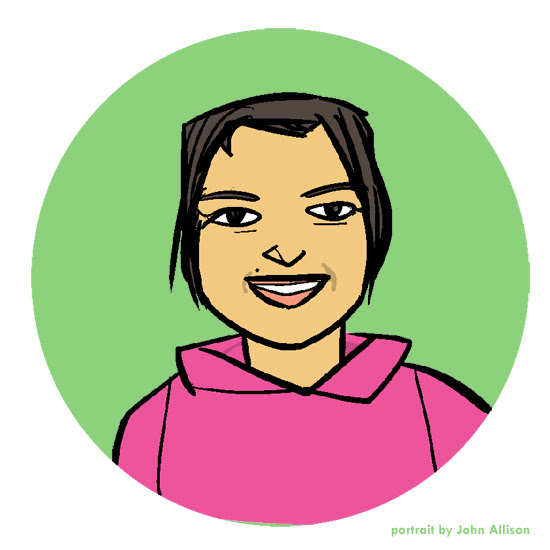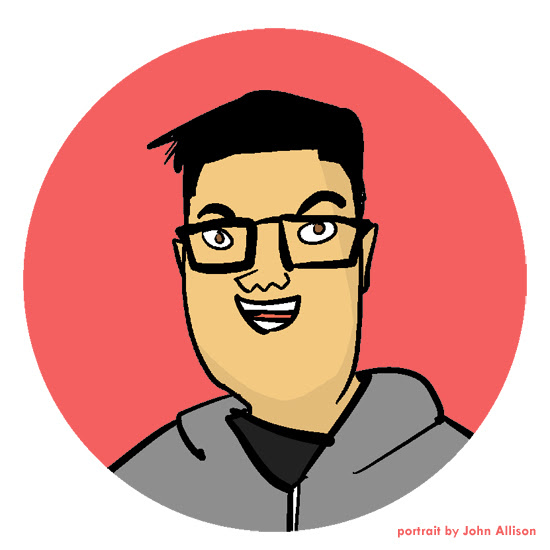If Marvel’s Hip Hop variant covers and the #DCYou campaign are meant to increase diversity in comics, our industry needs to understand authentic representation on a deeper level. While celebrating Black culture and spotlighting a few diverse characters is a small step in the right direction, it can be a slippery slope to tokenism and the commodification of race and ethnicity. To authentically include POC voices and perspectives we need advocates on the inside, at the editorial level.
Working for Mark Chiarello at DC Comics as assistant editor on titles like Before Watchmen, I can speak to some of these issues personally. However, to obtain a spectrum of experiences, I reached out to editors of color from various publishers, including Marvel. I had the opportunity to interview Charlie Chu and Robin Herrera of Oni Press in person. My old colleague, Harvey Richards of DC Comics, responded via email; I’ve included his answers alongside Chu and Herrera’s below for the sake of clarity.
Robin Herrera: I consider myself both White and Latina. In person, I’m treated as I’m White, but I did kind of wonder if [my last name] was why it was so hard for me to find a job for so long. I was really bad at getting jobs, even though I had work experience. It’s hard to prove, so I can’t say for sure.
Charlie Chu: In almost any given comics function, I’m hyper aware of being one of the few, if not the only, [POC] in a room at any given time. Comics isn’t inherently racist, but I think the industry and readership demographic is skewed in a very particular way. It’s an interesting time to talk about diversity in comics. There’s been an aggressive push to having female creators and voices, but race is just on the edge of becoming a real conversation.
I think POC can be pigeonholed. People want to look at you as very one-dimensional. The minute you want to tell a story that speaks to a POC audience, White audiences get very offended; as though you’re banning White content [laughs]. It speaks to a tone-deafness that you constantly have to be on the watch for and yell about on Twitter [laughs].
Harvey Richards: Because of my light complexion…Most people assumed that I was mixed, but [we’d] have to go back about five generations to find a white person in my family…There are good and bad things about [my appearance], but ultimately, it allows me to navigate between both [Black and White] worlds, which gives me unique perspective.
The biggest challenge is getting the veterans to take me seriously in the comics industry. I used to think that they would be thrilled with new ideas and perspectives, but I’ve come to realize that they’re happy the way it is. They only change when they have to and change doesn’t come from the inside. It comes from the outside, from competitors. With the shift in audience, movies, video games, and the decline in comic sales, they seem more open to new ideas, now more than ever. For me, it’s a very exciting time in comics.
Herrera: My love of stories and storytelling came from my grandma, who used to tell us creepy Mexican tales of ghost women… There’s a trend where you take a very Disney-esque princess story and there’s a diverse character as the lead, but it’s follows a Hans Christian Andersen [model]. I’d love to see fairy tales from other cultures embiggened in the way that these princess fairy tales are.
Chu: The stories I want to see have less to do with, say, my own Vietnamese-American experience and more to do with a broad Immigrant-American experience. In a mainstream context, I get that there’s this whole continuity-driven history that’s Marvel/DC-centric, but I hope comics as a medium reinvents itself to skew younger, browner, more cosmopolitan and more engaged with today. There’s already enough content that’s rooted in nostalgia and that comes from a very White, middle-class, male perspective. From a brute, business standpoint, the only way indie pubs like Oni can make more money in comics is to hit the zeitgeist. And the zeitgeist wants [younger,] more female-friendly, and diverse books.
Richards: In most cases…I can comment on how a character can be drawn, designed, colored, or even speak. Those small subtle changes can be immediately undone by the next creative team that doesn’t understand the context behind those choices…To truly make a difference in comics you need a POC at the beginning stages of development, so the foundation of the concept is stronger and more reflective of diverse ideas. [Otherwise] you’ll just get what you always get when you go to the same sources.
TMS: What are some solutions that could help shape a world that’s more inclusive of POC?
Chu: For me, progressive diversity comes from business practices. In comics, where everything is about pre-awareness and pre-branding, especially with talent who’ve done other work, you end up with this myopia where White creators get more work writing White characters, because there’s never space to get new people in. Oni Editorial had a lot of long conversations about addressing the lack of diversity in our talent pool and now we’re sitting on 2,700 submissions that we’re killing ourselves trying to get through. You can do all the interviews in the world and talk a big game about it, but it doesn’t matter unless you’re actually hiring people.
Richards: Comics need more POC as editors. With like minded people behind-the-scenes they can find and nourish talent. Many of the biggest names in comics reached that level because they had an editor or, in some cases, editors who believed in them. Timing and skill are everything.
TMS: How can your company help create more racially diverse stories?
Chu: If you’re interested in having female characters, you have to hire female writers. If you want to see Black characters, you have to hire Black creators. Even if you’re working with a White creator, you don’t have to drive an agenda or an ideology, but making a story more three-dimensional is always good. As a POC [editor] you just have to be aware of your opportunities to make projects better in that way. Working in publishing and editorial, the activism from wanting to see increased diversity comes in a very backchannel way that gets you no glory. You stack the deck on the backend in story development and in how you hire people, but that’s not necessarily something you need to chest beat with or brand in a specific way.
One of my favorite books that I work on right now is a series called Kaijumax. I think it’s one of the most ethnically diverse floppy comics right now. It isn’t about tokenism, like ‘Oh, you want an Asian-American hero? They have to wear a Japanese flag on their chest.’ It’s a world where there’s a kaiju prison in the South Pacific, and of course the prison guards working there would be a bunch of Asian people, but in our story they’re just characters and it makes logical sense.
Richards: [DC Entertainment] could lead the industry by providing it with diverse concepts and creators.
TMS: Where do you draw the line on a comic professional’s public opinion on POC issues? Would certain expressions lead to ostracization (i.e. not getting hired as much)?
Herrera: I don’t think that anyone should ever feel like they have to be quiet. I don’t know what advice to offer to make sure they get hired. It’s tricky, because the people who wouldn’t hire them because of [being vocal] are still not going to want to hire them. At the very least, [for Oni,] it wouldn’t be a detriment.
Chu: I think people who blackball creators for being vocal should be outed publicly, personally. Bad behaviour is put behind a curtain for way too long and people who are participating in bigoted business practices should be outed on a regular basis.
I’m a big fan of comics functioning more as a community and less as a bunch of isolated loudmouths, which is what the cult of personality can engender. All of this is important as we go through a growing pains period talking about diversity. The controversy that Marvel is going through with the hip hop covers is great. I don’t think there was any malicious intent, but the discussion that it’s forced is fantastic in it of itself.
Richards: I won’t hire or support a person just because they’re a POC. I look for talent first. I have no idea what leads to ostracization. No one editor edits the same way. We all have different taste and preferences. Like any industry, people will work with [those] who have the same views that they have. They all want to tell the same stories, laugh at the same jokes, and reminisce over the same comic book events of the past. Everyone wants their job to be as stress free as possible. It take a special editor who’s willing to work [outside] of their comfort zone. A 20 year-old POC may think an editor’s ideas are old and repetitive. Likewise, this 40 to 50-year-old editor has to take more time out of their day to teach and correct this freelancer who doesn’t know the basics of storytelling, balloon placements, etc. Some freelancers take instructions well, while others don’t. In many instances it’s all about personalities.
——————————
Comics is a business at the end of the day, but we need to be wary of flattening “Diversity” into a marketing tool. Without authenticity, representation falls down the tokenism trap and co-opts POC identities and experiences. Diversity must be folded into the universal voice. Representing races and ethnicities on the page isn’t enough. Our voices need to be heard, especially behind-the-scenes.
I’ll be delving deeper into diversity topics and exploring solutions at the upcoming Geeks of Color panel at New York Comic Con. Come participate on October 9, 6:30PM, room 1A01!
In the meantime, I offer the following suggestion based on my own professional experience at Marvel and DC: if the big two’s current push for diversity was indeed prompted from outside competition, we as readers can foster more diverse stories by diversifying our pull list. Here are some great titles outside of the big two:
POC as Artist
Bitch Planet, Valentine De Landro, Image Comics
The Death-Defying Doctor Mirage, Roberto De La Torre, Valiant Entertainment
Imperium, Doug Braithwaite, Valiant Entertainment
School Spirit, Fresh Romance, Arielle Jovellanos, Rosy Press
Exodus: The Life After, Gabo, Oni Press
POC as Writer
Number 13, Robert Love & David F. Walker, Dark Horse
The Empty, Jimmie Robinson, Image Comics
Concrete Park, Erika Alexander, Dark Horse
Postal by Bryan Hill, Top Cow
Buzz, Ananth Hirsch, Oni Press
Other great sources of content are the Nerds of Color blog and webcomics by women of color. It’s crucial to support indie works, because that’s how diverse creators can break into the mainstream. If you have any other titles to suggest, list them in the comments below!
—Please make note of The Mary Sue’s general comment policy.—
Do you follow The Mary Sue on Twitter, Facebook, Tumblr, Pinterest, & Google +?











Published: Oct 5, 2015 12:55 pm